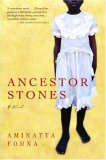Summary | Excerpt | Reading Guide | Reviews | Beyond the Book | Readalikes | Genres & Themes | Author Bio

Critics' Opinion:
Readers' Opinion:
First Published:
Sep 2006, 336 pages
Paperback:
Sep 2007, 336 pages
 Book Reviewed by:
Book Reviewed by:
BookBrowse Review Team
Buy This Book
London, July 2003.
IT BEGAN WITH A LETTER, as stories sometimes do. A letter that arrived one
day three winters ago, bearing a stamp with a black and white kingfisher, the
damp chill of the outside air, and the postmark of a place from which no letter
had arrived for a decade or more. A country that seemed to have disappeared,
returned to an earlier time, like the great unfilled spaces on old maps here
once map makers drew illustrations of mythical beasts and untold riches. But of
course the truth is this story began centuries ago, when horsemen descended to
the plains from a lost kingdom called Futa Djallon, long before Europe’s map
makers turned their minds to the niggling problem of how to fill those blank
spaces.
A story comes to mind. A story I have known for years, it seems, though I
have no memory now of who is was who told it to me.
Five hundred years ago, a caravel flying the colours of the King of Portugal
rounded the curve of the continent. She had become becalmed somewhere around the
Cape Verde Islands, and run low on stocks, food and water. When finally the
winds took pity on her, they blew her south-east towards the coast, where the
captain sighted a series of natural harbours and weighed anchor. The sailors,
stooped with hunger, curly haired from scurvy, rowed ashore, dragged themselves
through shallow water and on up the sand where they entered the shade of the
trees. And there they stood and gazed about themselves in disbelief. Imagine!
Dangling in front of their faces: succulent mangoes, bursts of starfruit,
avocados the size of a man’s head. While from the ends of their elegant stalks
pineapples nodded encouragingly, sweet potatoes and yams peeped from the earth,
and great hands of bananas reached down to them. The sailors thought they had
found no less a place than the Garden of Eden.
And for a time that’s what Europeans thought Africa was. Paradise.
The last time I thought about that story was a week after the letter came. By
then I had left London—the city I now call home—to retrace the letter’s route to
the place from where it had come and beyond. I was standing in a forest just
like the one the sailors had stumbled into. And I remembered how in the early
morning I used to watch my grandmothers, my grandfather’s wives, leave their
houses and make their way, down the same path upon which I was standing, towards
their gardens. One by one each woman parted from her companions and went to her
own plot, whose boundaries were marked by an abandoned termite hill, a fallen
tree, and upright boulder. There, among the giant irokos, the sapeles and the
silk-cotton trees of the forest, she tended the guavas, pawpaws and roseapples
she had planted there. Then she weeded her yams and cassava where they grew in
the soft, dark earth and watered the pineapple plant that marked the centre of
her plot.
I thought of the sailors’ story. And for a long time, I thought it was just
that. A story. About how Europeans discovered us and we stopped being a blank
space on a map. But months later, after the letter arrived and I traced its arc
and came to land with a soft thud in an enchanted forest, and after I had
listened to all the stories contained in this book and written them down for
you, that one story came back to me. And I realised the story was really about
something else. It was about different ways of seeing. The sailors were blind to
the signs, incapable of seeing the pattern or logic, just because it was
different to their own. And the African way of seeing: arcane, invisible yet
visible, apparent to those who belong.
The sailors saw what they took to be nature’s abundance and stole from the
women’s gardens. They thought they had found Eden, and perhaps they had. But it
was an Eden created not by the hand of God, but the hands of women.
Excerpted from Ancestor Stones, (c) 2006 by Aminatta Forna. Reproduced with permission of the publisher, Grove Atlantic. All rights reserved.





The Funeral Cryer by Wenyan Lu
Debut novelist Wenyan Lu brings us this witty yet profound story about one woman's midlife reawakening in contemporary rural China.
Your guide toexceptional books
BookBrowse seeks out and recommends the best in contemporary fiction and nonfiction—books that not only engage and entertain but also deepen our understanding of ourselves and the world around us.